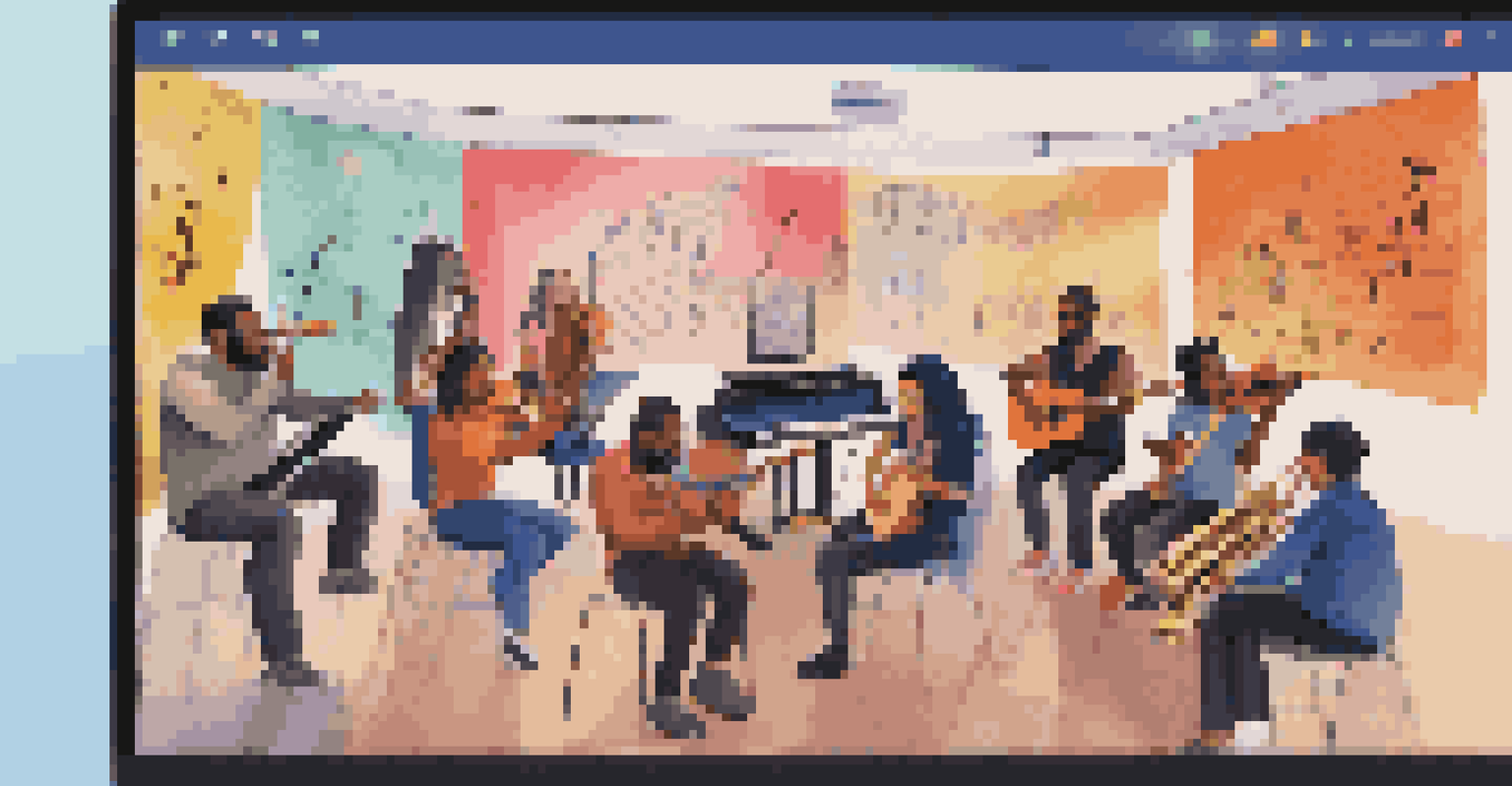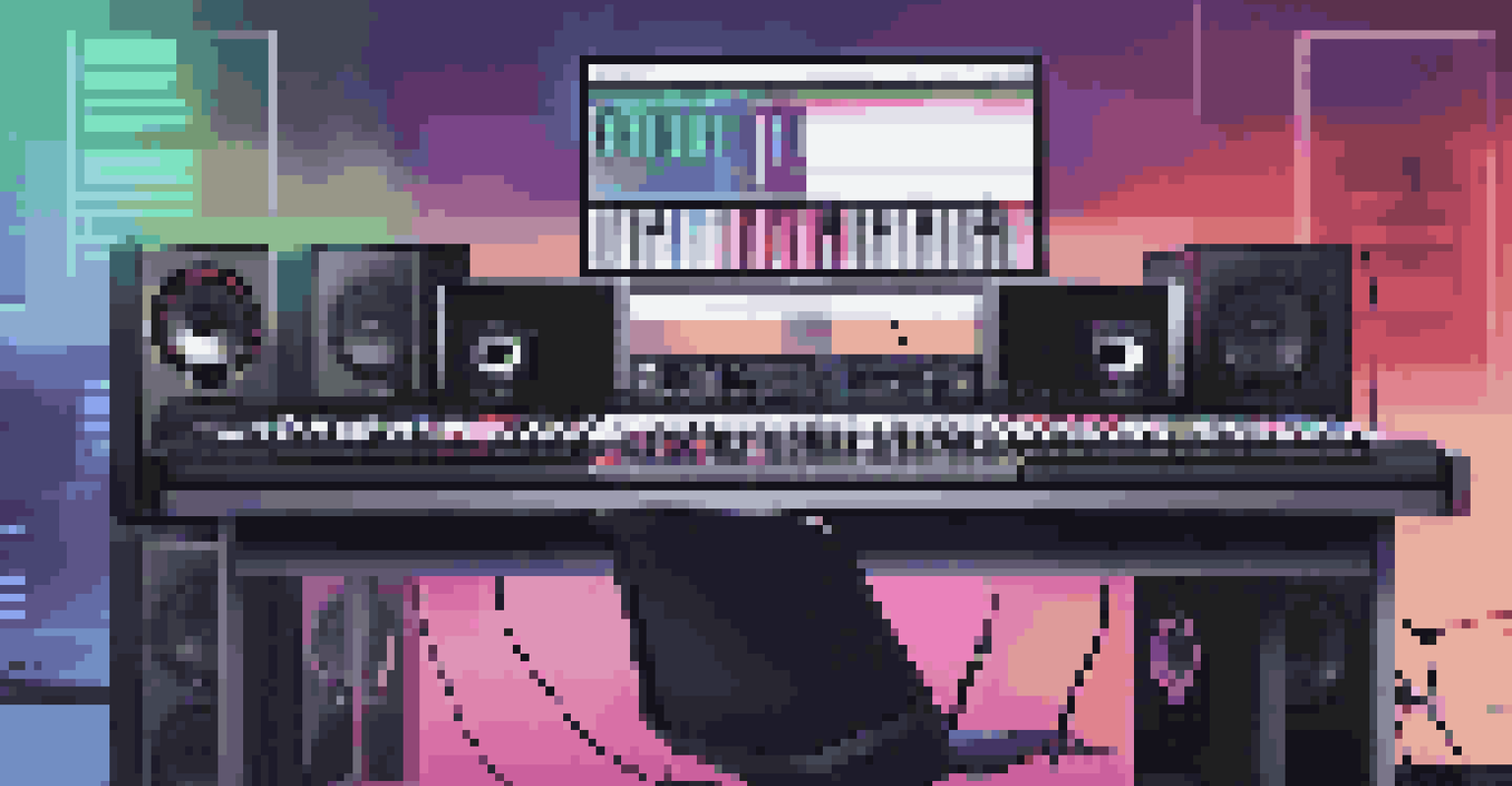The Impact of Online Music Education on Aspiring Musicians

The Rise of Online Music Education Platforms
In recent years, online music education has surged in popularity, offering aspiring musicians unprecedented access to learning resources. Platforms like YouTube, Skillshare, and dedicated music sites have democratized music education, allowing anyone with an internet connection to learn. This shift has transformed traditional music learning, enabling students from all walks of life to explore their musical talents.
Education is the most powerful weapon which you can use to change the world.
With a wealth of tutorials, courses, and workshops available online, individuals can tailor their learning experiences to fit their unique needs and schedules. Whether you want to learn guitar, piano, or music theory, there’s something for everyone. This flexibility is especially beneficial for busy students or those balancing jobs and personal commitments.
Moreover, online platforms often provide opportunities to connect with professional musicians and educators from around the world. By breaking geographical barriers, aspiring artists can receive guidance and mentorship that would have been impossible in a traditional classroom setting. This global connection enriches the learning experience and fosters a sense of community among musicians.
The Accessibility of Music Education
One of the most significant impacts of online music education is its accessibility. No longer do aspiring musicians have to travel long distances to attend classes or find a skilled teacher. With just a few clicks, they can access a range of lessons that suit their skill level and musical interests.

This increased accessibility also extends to financial considerations. Many online resources are free or available at a fraction of the cost of traditional music schools. This affordability allows a wider audience to explore their passion for music without the burden of hefty tuition fees, making music education more equitable.
Accessibility of Music Education
Online platforms provide easy access to music education, breaking geographical and financial barriers for aspiring musicians.
For those in remote areas, online education can be a game-changer. Students who previously lacked access to quality music instruction can now learn at their own pace, guided by talented educators. This level of inclusivity helps nurture a diverse range of musical talents that might otherwise go unnoticed.
Personalized Learning Experiences
Online music education allows for a highly personalized learning experience, catering to each student's unique needs and goals. Unlike traditional classrooms, where one-size-fits-all approaches can leave some students behind, online platforms offer customized paths. Students can choose courses that resonate with their interests, whether it's jazz improvisation or classical composition.
The beautiful thing about learning is that no one can take it away from you.
Additionally, many online courses incorporate interactive elements such as quizzes, feedback loops, and practice assignments, which enhance the learning process. This interactivity encourages students to engage actively with the material, fostering a deeper understanding of concepts. As a result, learners can progress at their own pace, building confidence as they master new skills.
The ability to revisit lessons and practice as needed is another advantage. Students can pause, replay, or skip content based on their familiarity and comfort level. This flexibility contributes to a more thorough grasp of musical techniques, ultimately leading to improved performance and creativity.
Building a Global Network of Musicians
Online music education has also facilitated the creation of vibrant global networks of musicians. Through forums, social media groups, and collaborative projects, aspiring musicians can connect with peers and professionals worldwide. These connections foster collaboration, inspiration, and the sharing of ideas, which is invaluable in a creative field like music.
Participating in online communities allows musicians to receive constructive feedback on their work, which is crucial for growth. Engaging with a diverse group of artists can introduce fresh perspectives and techniques that enhance one's craft. This exchange of knowledge enriches the artistic journey and encourages experimentation.
Personalized Learning Experiences
Students can tailor their music education to fit their individual needs and interests, allowing for a more engaging and effective learning process.
Furthermore, these networks can lead to opportunities beyond just learning. Aspiring musicians can find collaborators for projects, gigs, or even their own bands. The relationships formed in these online spaces can play a pivotal role in shaping their careers and expanding their horizons.
The Role of Technology in Music Learning
Technology plays a crucial role in enhancing the online music education experience. Tools such as digital audio workstations, music notation software, and even apps for music theory make learning more interactive and engaging. These technologies allow students to create and edit their music, fostering creativity and innovation.
Moreover, many platforms incorporate video tutorials and live sessions that provide real-time feedback and instruction. This immediate interaction helps students correct mistakes and refine their skills on the spot, mirroring the benefits of traditional lessons. The use of technology also prepares students for modern music industry demands, where proficiency in digital tools is essential.
As technology continues to evolve, so too will the methods of music instruction. Virtual reality, artificial intelligence, and other emerging technologies promise to take online music education to new heights, making it even more immersive and effective. This dynamic landscape ensures that aspiring musicians have access to the latest tools and techniques, keeping their education relevant.
Challenges of Online Music Education
While online music education offers numerous benefits, it’s not without its challenges. One significant hurdle is the potential for students to feel isolated or disconnected from their peers and instructors. Unlike traditional classrooms that foster community, online environments can sometimes lack the personal touch and camaraderie that come from face-to-face interactions.
Additionally, the sheer volume of available resources can be overwhelming for beginners. With countless courses, tutorials, and materials, students may struggle to find the right path or become discouraged if they don’t progress as quickly as they hoped. This information overload can lead to frustration and a lack of motivation.
Building Global Music Networks
Online music education fosters connections among musicians worldwide, facilitating collaboration and creative exchange.
Lastly, self-discipline plays a critical role in online learning. Without the structure of a classroom setting, some students may find it challenging to stay committed and engaged. Developing effective study habits and time management skills is essential for success in this format, and not all students are equipped to navigate this transition smoothly.
The Future of Online Music Education
As we look to the future, the role of online music education is only expected to grow. The ongoing advancements in technology will continue to shape how music is taught and learned. From virtual reality classrooms to AI-driven personalized lessons, the possibilities for innovation are endless.
Moreover, the increasing acceptance of online education will likely lead to more collaborations between traditional music schools and online platforms. This hybrid approach could offer students the best of both worlds, combining the structure of in-person instruction with the flexibility of online learning.

Ultimately, the future of online music education promises to empower aspiring musicians like never before. With greater access to resources, personalized learning experiences, and a global network of support, the next generation of musicians will have the tools they need to thrive in an ever-evolving musical landscape.